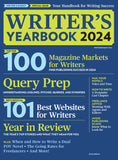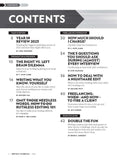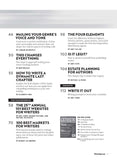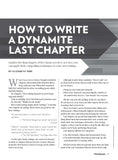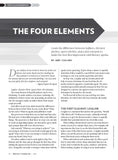Writer's Yearbook 2024 (Digital Edition)
The 2024 Writer’s Yearbook, presented by Writer’s Digest, is a comprehensive, all-in-one resource for writers who need a boost to finish the year on a strong note or start planning their new years’ writing goals. Featuring the top websites and markets for writers, plus articles on freelancing, creativity, writing book-length works, and attracting an agent, this special publication has something for any writer looking to get their work published.
2023 The Year in Publishing: A roundup at the hottest topics in publishing in 2023. By Jane Friedman
Preparation & Progress
- Writing What You Know—Yourself: The writing advice “write what you know” has existed for ages, but what does that really mean? This article explores ways to mine your life for the sake of your writing. By Whitney Hill
- Writing Exercises for Your Left Brain and Right Brain: Improve your creativity and writing by giving your brain a workout based on which side of your brain you favor. By C. Hope Clark
- Omit Needless Words: Ruthless Editing 101: 10 tips to make your writing efficient, yet engaging. By Ryan G. Van Cleave
Freelancer’s Workshop
- How Much Should I Charge: The creator of Funds for Writers did all the research on the going rates freelancers can and should charge. By C. Hope Clark
- When and How to Fire a Freelance Client: Working as a freelancer means sometimes having to make tough choices about who you work with. Jeff Somers offers advice for determining when it’s time to let a client go—and how to do so politely. By Jeff Somers
- Former WD managing editor Zachary Petit shares advice for what to do when you end up working with a nightmare editor. By Zachary Petit
- 5 questions to ask during almost every interview and why those questions might help you get the most interesting answers. By Don Vaughan
Book Building
- How to Write a Dynamite Last Chapter: When it comes to the end of a novel, how can you write a last chapter that sticks with readers long after they finish reading? Elizabeth Sims analyzes the final chapter of 5 standout novels and identifies how you can make their approaches work for you. By Elizabeth Sims
- Nail Your Genre’s Voice & Tone: Beyond identifying key traits of genres and subgenres, a critical piece of connecting with your genre’s readers is capturing the language and mood of the genre. Writing instructor Jordan Rosenfeld breaks it all down. By Jordan Rosenfeld
- 5 Steps to Approach Writing Your Story’s Inciting Incident: Ran Walker explains what the inciting incident of a story is and five ways to execute it, so readers are hooked into the story with enough information at the right time. By Ran Walker
- Writing a Dual POV Novel: Writing a novel with two points of view has specific challenges including two narratives, plotlines, and arcs. Brian Kennedy explains how. By Brian D. Kennedy
For Your Reference
- The 25th Annual 101 Best Websites: This list singles out the best resources for established and aspiring writers across all genres. By The Editors of WD
- Top 100 Magazine Markets for Writers: WD Senior Editor and editor of the Writer’s Market 100th Edition, Robert Lee Brewer, has found 100 of the hottest markets and shares all the details for your best bet at publication. By Robert Lee Brewer
- Is it legit? Publishing scams are on the rise. A publishing attorney shares tips for how to protect yourself. By Amy Cook
- Estate Planning for Authors: 5 simple steps to protect your legacy and make it as easy as possible for your loved ones. By Michael La Ronn
- The Four Elements: Learn the difference between loglines, elevator pitches, query pitches, and a plot synopsis to make the best first impression with literary agents. By Amy Collins, literary agent at Talcott Notch







